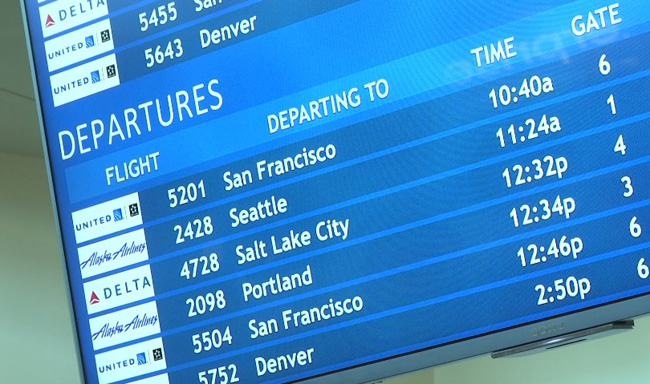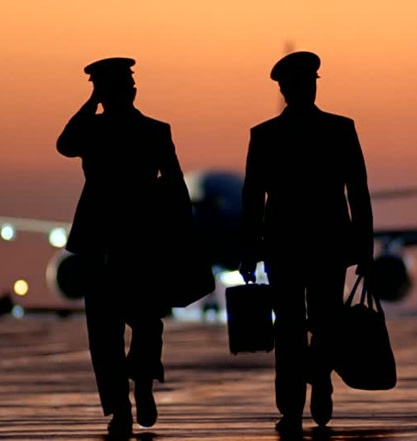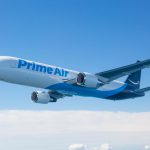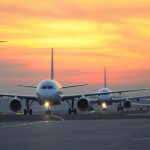Where to Live? Domicile Choices At Legacy, Major, and Regional Airlines

Few careers have as much flexibility as pilots when it comes to choosing where to live. But the location choice can have significant impact on a pilot’s quality of life and career advancement. Read more to learn the factors you need to consider …
Domicile – in airline terms this is the permanent location of flight crew. Work schedules begin and end at the domicile where a flight crew is based. Some airlines have only a few domiciles while others can have several domiciles spread throughout the country, or even internationally.
One of the never-ending challenges pilots face in their career is deciding the domiciles they will work from. This decision is first made at a high-level by the employer a pilot decides to work for. But pilots will also face the decision throughout their time at a specific employer as most have the option to change domiciles.
Living in Domicile vs Commuting
Pilots can choose if they want to live in base or if they want to commute to their base. Commuting used in this context refers to getting a space-available ride to work on an airline or cargo flight. The flight benefits and jumpseat agreements pilots have as part of their job affords the option of commuting.
Pilots that choose to commute will spend more time away from home than the pilots that live in base.
There are several factors to consider when deciding whether or not to commute:
- Availablity of flights between home and domicile
- Employer’s commuter policy
- Time Spent Commuting
- Likelihood of being on reserve for a prolonged period of time
- Whether you want to have the option for extra flying and premium pay
Airline Flight Availability and Commuter Policy
The flights available for commuting will have significant impact on a commuting pilot’s time spent away from home. This includes the flight frequency, distance the pilot has to commute, and whether their commute will involve just one leg or multiple legs.
An employer’s commuter policy, usually defined in an employment agreement, can make a significant difference in the stress associated with commuting to work. Commuter policies give pilots assurances of no disciplinary actions for not getting to work on time – so long as the pilot makes an effort required by the commuter policy to get to work. If a pilot doesn’t make it on time they will lose pay for the missed work but are able to rejoin their trip once they make it into position.
Extra Flying and Premium Pay
Most pilot employers have opportunities to pick up extra flying either for straight up extra pay or with premium pay options such 1.5 times normal rate. The extra flying option is referred to as open time. Open time extra pay can be substantial for pilots that make it a priority.
It is difficult for commuting pilots to pick up open flying due to their availability and the extra travel time needed to pick up small increments of flying. If you want to put yourself into a position to for extra pay then living in base is a more realistic choice.
Crash Pads
Some pilot commutes are easy and allow pilots to arrive in their domicile a short time ahead of beginning their assigned trips. Other commutes require pilots to arrive in domicile well ahead of the beginning of trips.
Pilots on reserve need to spend a significant amount of time in their domicile being available to their employer while waiting for a work assignment.
Flight crew that need to spend more time in their domicile will often find crash pads. Crash pads are cheap (often shared) housing arrangements that provide pilots with the bare minimum to sleep and rest while waiting for assignments. Crash pads are an added expense for flight crew needing them.
Some employers offer a set amount of hotel room availability, paid by the employer, to commuting pilots as part of their compensation.
Domicile’s Impact on Quality of Life and Career Progression
There are factors to consider when choosing a base. The first consideration is getting off reserve and getting regular lines of flying. Regularly scheduled lines mean more days off, more income, the opportunity to pick up extra flying, and the peace of mind of having a set schedule.
The best way to get off reserve quickly is to pick domiciles staffed by more junior pilots or to pick larger bases. Crew domiciles end up being staffed by more junior pilots due to cost of living, quality of life considerations, aircraft types operated out that base, where pilots typically fly to out of a base, and trip schedules.
Not only are junior bases easier to hold a line of flying in but they can provide quicker opportunities to upgrade into larger airplane types or upgrading into a captain position.
Larger bases typically provide a wider range of flying. They will have a mix of shorter vs longer trips and a range of show times to suit each pilot’s work preferences.
Domicile Considerations
There are several considerations when looking at potential domiciles.
East Coast Domiciles With High Cost of Living
For most pilot employers there is a trend for east coast domiciles with high costs of living to be the most junior crew domiciles. Pilots often avoid living in these areas to increase the spending power of their paychecks. West coast bases are frequently more senior for most pilot employers.
Commuter-Centric Airports
There are cities scattered around that have low cost of living while also having good flight access to several major operational hubs. These are popular cities to live in for flight crew and can sometimes be a challenge when competing with others for limited space-available seating.
Multi-Leg Commutes and Quality of Life
Commutes requiring more than one flight leg add significant time to commuting. These will cause pilots to be gone from home far more than single leg commutes and make getting to work more stressful.
Commuting to Reserve
Commuting to reserve requires pilots to spend significant amounts of time away from home. Pilots will spend a good chunk of this time from home not flying, and instead waiting for work assignments to be assigned by their employers.
Longer Trips for Commuting
As a general rule, commuting flight crew will want longer trips while at work – such as working four day trips rather than working one or two day trips. This means less time spent commuting and less need for crash pads. Commuters will often seek trips that begin late in a day or end early in a day to lessen the need to stay overnight in their domicile.
Non-hub Domiciles Are At Risk
If you are considering a domicile that isn’t a hub that base should be viewed as temporary. Airline and cargo operations are fluid and employers will frequently open and close outstations. It would be wise to not uproot families or even consider purchasing a home for a domicile unless that city is an operations hub.
Plane Lock vs Domicile Lock
Employers require pilots to stay in an airplane type for a set period of time after being qualified to fly it. This is to cover training costs and to prevent extra training cycles from pilots jumping around between airplane types.
Employers rarely lock pilots into specific domiciles for periods of time. However, if there is a specific domicile you wish to work from it is good to plan airplane types around those that are based in your desired domicile.
Legacy and Major Airline Domestic Pilot Domiciles

ACY Atlantic City, NJ
ANC Anchorage, AK
ATL Atlanta, GA
AVL Asheville, NC
BLI Bellingham, WA
BOS Boston, MA
BWI Baltimore, MD
CLE Cleveland, OH
CLT Charlotte, NC
CVG Cincinnati, OH
DAL Dallas, TX
DCA Washington, DC
DEN Denver, CO
DFW Dallas, TX
DTW Detroit, MI
EWR Newark, NJ
FLL Fort Lauderdale, FL
HNL Honolulu, HI
HOU Houston, TX
IAD Washington, DC
IAH Houston, TX
IND Indianapolis, IN
IWA Phoenix, AZ
JFK New York City, NY
LAS Las Vegas, NV
LAX Los Angeles, CA
- American Airlines
- Alaska Airlines
- Allegiant Air
- Delta Air Lines
- United Airlines
- Virgin America
- FedEx Express
LGA New York City, NY
LGB Long Beach, CA
MCO Orlando, FL
MDW Chicago, IL
MEM Memphis, TN
MIA Miami, FL
MSP Minneapolis, MN
MYR Myrtle Beach, SC
OAK Oakland, CA
ONT Ontario, CA
ORD Chicago, IL
PDX Portland, OR
PHL Philadelphia, PA
PHX Phoenix, AZ
PIE St Petersburg, FL
PIT Pittsburgh, PA
SDF Louisville, KY
SEA Seattle, WA
SFB Orlando, FL
SFO San Francisco, CA
SLC Salt Lake City, UT
STL St. Louis, MO
VPS Fort Walton, FL
Legacy and Major Airline International Pilot Domiciles

Regional Airline Domestic Pilot Domiciles
ACK Nantucket, MA
- Cape Air
ALB Albany, NY
- Cape Air
ANC Anchorage, AK
- Peninsula Airways
- Corvus Airlines
- Ravn Alaska
ATL Atlanta, GA
- ExpressJet Airlines
- Endeavor Air
AUG Augusta, ME
- Cape Air
BIL Billings, MT
- Cape Air
BOI Boise, ID
- Horizon Air
BOS Boston, MA
- Peninsula Airways
- Cape Air
CGI Cape Girardeau, MO
- Cape Air
CLE Cleveland, OH
- ExpressJet Airlines
CLT Charlotte, NC
- PSA Airlines
CMH Columbus, OH
- Republic Airways
CVG Cincinnati, OH
- PSA Airlines
DAY Dayton, OH
- PSA Airlines
DCA Washington, DC
- Republic Airways
- PSA Airlines
DEN Denver, CO
- Skywest Airlines
- GoJet Airlines
DFW Dallas, TX
- ExpressJet Airlines
- Envoy
- Mesa Airlines
DTW Detroit, MI
- ExpressJet Airlines
- Endeavor Air
- Compass Airlines
EWB New Bedford, MA
- Cape Air
EWR Newark, NJ
- ExpressJet Airlines
- Republic Airways
- CommutAir
FAT Fresno, CA
- Skywest Airlines
FLL Fort Lauderdale, FL
- Silver Airways
GDV Glendive, MT
- Horizon Air
GGW Glasgow, MT
- Cape Air
HNL Honolulu, HI
- ‘Ohana by Hawaiian
HPN White Plains, NY
- Cape Air
HVR Havre, MT
- Cape Air
HYA Hyannis, MA
- Cape Air
IAD Washington, DC
- Mesa Airlines
- Trans States Airlines
- Silver Airways
- CommutAir
- Air Wisconsin
IAH Houston, TX
- ExpressJet Airlines
- Skywest Airlines
- Mesa Airlines
- Republic Airways
IND Indianapolis, IN
- Republic Airways
IRK Kirksville, MO
- Cape Air
JFK New York City, NY
- Endeavor Air
LAX Los Angeles, CA
- Skywest Airlines
- Compass Airlines
LEB Lebanon, NH
- Cape Air
LGA New York City, NY
- ExpressJet Airlines
- Republic Airways
- Endeavor Air
MCI Kansas City, MO
- Republic Airways
MCO Orlando, FL
- Silver Airways
MDT Harrisburg, PA
- Piedmont Airlines
MFR Medford, OR
- Horizon Air
MIA Miami, FL
- Republic Airways
MKE Milwaukee, WI
- Air Wisconsin
MSP Minneapolis, MN
- Skywest Airlines
- Endeavor Air
- Compass Airlines
MSS Massena, NY
- Cape Air
MVY Martha’s Vineyard, MA
- Cape Air
MWA Marion, IL
- Cape Air
OGS Ogdebsburg, NY
- Cape Air
OLF Wolf Point, MT
- Cape Air
ORD Chicago, IL
- ExpressJet Airlines
- Skywest Airlines
- Republic Airways
- Envoy
- GoJet Airlines
- Trans States Airlines
- Air Wisconsin
ORF Norfolk, VA
- PSA Airlines
OWB Owensboro, KY
- Cape Air
PDX Portland, OR
- Skywest Airlines
- Horizon Air
PHL Philadelphia, PA
- Republic Airways
- PSA Airlines
- Piedmont Airlines
PHX Phoenix, AZ
- Skywest Airlines
- Mesa Airlines
PIT Pittsburgh, PA
- Republic Airways
PSP Palm Springs, CA
- Skywest Airlines
PVC Provincetown, MA
- Cape Air
PVD Providence, RI
- Cape Air
RDU Raleigh-Durham, NC
- GoJet Airlines
RKD Rockland, ME
- Cape Air
Greg started his professional pilot journey in 2002 after graduating from Embry Riddle. Since that time he has accumulated over 8,000 hours working as a pilot. Greg’s professional experience includes flight instructing, animal tracking, backcountry flying, forest firefighting, passenger charter, part 135 cargo, flying for a regional airline, a national low cost airline, a legacy airline, and also working as a manager in charge of Part 135 and Part 121 training programs.



